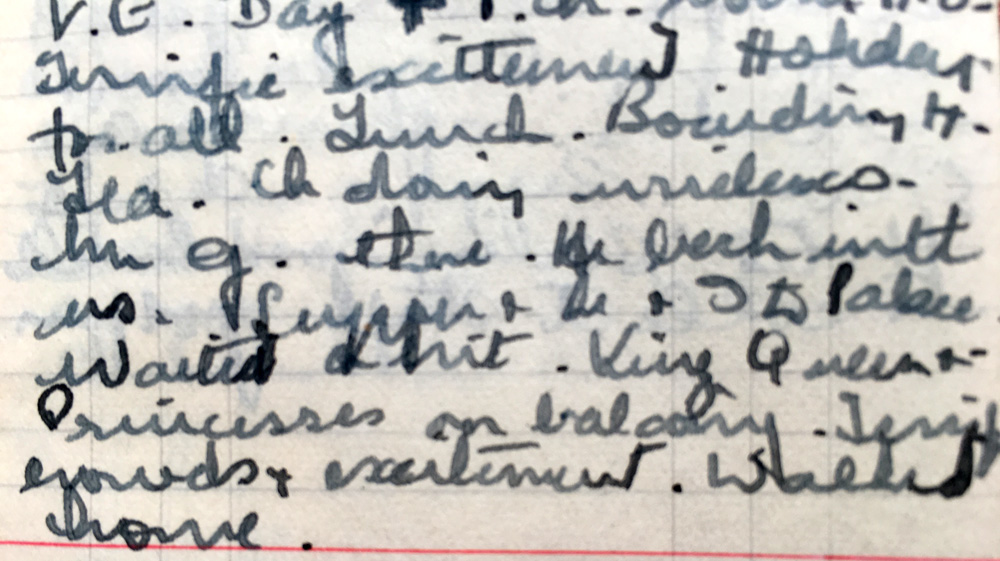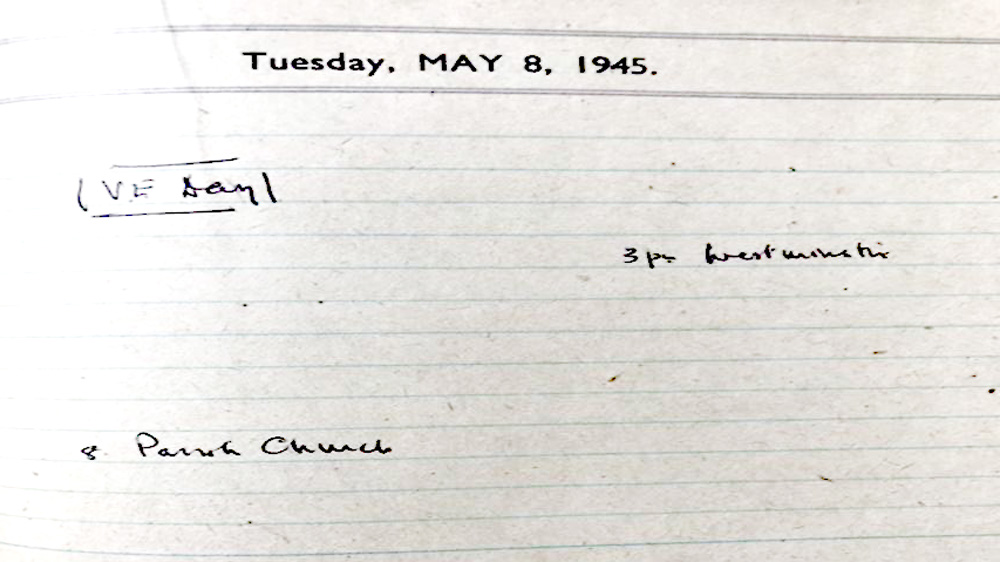VE Day reminiscences


National plans for the celebration of the 75th Anniversary of VE Day on 8th May 2020 have had to be scaled down due to the global Pandemic of Corona Virus. Nevertheless, with a forecast of fine sunny weather some are still using the day to mark the remembrance of the end of the Second World War in Europe and especially all those who fought for freedom, and also to pay tribute to all those currently fighting the deadly virus on the front line. Inevitably comparisons have been made between the two, but a marked difference is the requirement at present to ‘socially distance’ and ‘stay at home’.
I thought it would be interesting to collect the memories of some our senior members of our congregation at HPC. It seems that for those under the age of 10 at the time, who lived outside London, the event almost passed them by. Sheila Christie Murray, away at boarding school in Worthing, remembers little. Her older brother Martin was sent home from his boarding school and he remembers going into London on his own. He says he had never seen so many people in one place before; it was fantastic. He was literally swept off his feet and carried along by the crowd.
Derek Bunn remembers VE Day as a happening, but with no clear picture of what he was doing. He lived in a village 7 miles from his school in Wisbech. Jenny Bunn was 8 years old, and remembers a street party, with tables down the road and bunting.
Jean Hathorn recalls: On VE Day we were staying in Beaconsfield. I was 11 years old. I recall there was a wonderful feeling of relief and jubilation, knowing that there would be no more nights spent in air-raid shelters and we would be finally returning to our London home in Weymouth Street after such a long absence. There were church bells ringing and the skies were illuminated with exploding fireworks.’
Roger Corley was twelve by VE Day and living in Hull. He remembers the day as ‘a day of sombre relief rather than a day of jubilation. In the evening people gathered in the central Queen’s Gardens. My brother, then sixteen, persuaded my parents that the three of us could join in and, disappointed that fireworks were not available, decided to take and let off a firework of his own making. I think it was a rocket which he stuck in the ground. Luckily, no-one was hurt when it exploded, but the next morning we went to inspect the crater in the grass – from unreliable memory I would say it was inches deep and about a foot across!” Fireworks were clearly popular; Leon Rathbone recalls that he was living just outside Preston on VE Day, aged 15. ‘There was a large field at the bottom of our garden and lots of people gathered around a bonfire there. People brought fireworks that they put in a box, but a sparkler fell into it and the whole lot went off at once! The rockets were flying horizontally into the crowd and a few people were injured as a result!
Patrick Garland was 15 rising 16 on VE Day and living in a small Norfolk village. ‘My school extended the Easter holidays, so I was at home. Father was away in the Army. We had suffered from V1 flying bombs and the V2 rockets (a neighbouring farmer was blown across a field by one) which you couldn’t hear coming until after they had arrived), so the relief was enormous. We rang the church bells, had a huge impromptu bonfire, left the lights on (no blackout), fired guns in the air and let off ex Home Guard Thunder-flashes. There was a tinge of not going OTT as the war in the Far East was far from over and one battalion of the Royal Norfolks had been taken prisoner in Singapore. Then it was back to school and even stricter rationing as the Allies had to feed a starving Europe.’
Marguerite Morton and her parents were also living in Norfolk at the time. She says: I don’t have any memories of VE Day but I think it must have had a great impact on my parents as many friends were in the East Anglian regiment, captured in Singapore, so, for them the war was not over.
My father was a farmer, and much of the land he farmed was requisitioned for an American aerodrome until May 1945. They got to know many of the men well. My parents hardly slept on the nights the Hurricanes went out on bombing missions – they listened for the sound of the aircraft coming home – often they could hear the aeroplanes limping home on one engine; they prayed they would make it, but I know one crashed when very nearly home. Many did not get back across the Channel.’
John Willmer was away at school at Winchester College, aged just short of fifteen. ‘My recollection is that the housemaster came into breakfast (a meal which he usually took in his own part of the house) and told us that Germany had surrendered, so it was now peace in Europe (although the war against Japan continued in the Far East). Consequently, the Headmaster had decided that the day should be a special leave out day’. John decided, over ambitiously, to go off on a bike ride to see Corfe Castle. He never made it but did have a lovely day out!
Peter Loyd was a 22 yr old Captain in the Royal Marines on VE Day and Adjutant of 42 Commando. He was living in the State of Belgaum, India, where his unit was training to fight in the jungle. ‘We had news from the other side of the world of VE Day, but the war continued where we were.’
Some folk were living abroad at the time. Pamela Lloyd-Hart has a memory of her father Evan on the day putting an enormous Union Jack on the front of their house in Cape Town. She learnt only later that the flag was a political statement as well as a mark of celebration. Evan could not associate what he perceived as an Afrikaner emblem with the triumph of VE day, and opted for the Union Jack; this despite the fact that dissident Afrikaners under Jan Smuts procured the overthrow of Herzog in 1939 and brought South Africa into the war.
Monique Parsons was living with her mother and sister in St Germaine-en-Laye, in occupied France. They heard on the radio that the Americans were on their way to liberate Paris. St Germaine-en-Laye was set on a hill, and Monique rode out to a vantage point on her bicycle to see the first tanks rolling towards the city. ‘The Americans were throwing chocolate and chewing gum out of the tanks to us. I then biked back home and my mother had hung flags out.’
Meg Weston-Smith was evacuated to America for five years. ‘On 8 May 1945 I was in California, aged 12. On the West coast all eyes were on the war in the Pacific, and Europe seemed remote. I went to a school largely attended by children of scientists at the California Institute of Technology. My American host was an astronomer and friendly with Walter Baade, another astronomer, who was put under restrictions because he was German. I recall sympathy for him. They were wonderful years.’
Sheila Broadway, and her brother and sister were also evacuated across the Atlantic to Canada during the war. ‘We came back to our parents just before the end of the war – I remember doodlebugs – and I also remember an enormous bonfire and loads of people getting together on VE Day. I was 10 at the time’.
David Gardner’s mother Pat, recently deceased, was out in South Africa having left Belsize Park in 1940 to join her mother out there. She joined the South African Army and became a ‘Waasie’, stationed in Durban, that is a member of the Women’s Auxiliary Army Services. By the time VE Day came round she was 21 and romantically involved with a South Africa pilot, David Gardner (Senior) and the rest, as they say, is history…
Back in London, Bill Risebero was living in Enfield, aged 6 on VE Day. ‘The crowds in the Mall after Mr Churchill’s broadcast rather passed me by. I can just about remember my parents’ relief at the news, and them hanging a Union Jack from our window. I had lived all my conscious life through the War, so air raids and explosions were ‘normal’ to me, and I don’t think the concept of peace meant a lot. I do however remember the VE Day Celebrations in June the following year and seeing the King and Queen and the two princesses in procession through London. That left a big impression.
For Anne Stevens, then aged 2½, VE Day is her earliest memory. She remembers standing with her twin on a balcony at their home in in Notting Hill Gate watching the RAF flypast and wearing a hair ribbon in a braided red white and blue pattern! ‘And then the union flags on the lampposts in the Mall when we were taken to see the decorations a few days later’.
On VE Day Charles Perrin was 5 and living with his parents in a flat at 20B Ellerdale Road, Hampstead. He doesn’t remember VE Day, but like Bill does remember the Victory Parade a year later on 8th June 1946. His father, who was a significant figure in the war effort, had been given tickets for a stand to watch the parade. His mother had prepared a picnic lunch which in the excitement to get to the parade they forgot to take!
He remembers the bombing and being pushed under the kitchen table when there was an air raid. On one occasion a bomb dropped so close to the house that their windows were blown in. He also remembers a trip to London Zoo when an air raid started and people diving into the London Zoo tunnel which goes under the road.
Charles’ father kept a diary in which there is an entry which shows that at 8pm he visited ‘the Parish Church’. Charles is reasonably confident that this reference would have been to Hampstead Parish Church, so it would seem a service was held in church that evening. For more information on Charles’ father, buried in the Additional Burial Ground see http://tombwithaview.org.uk/abg-people/michael-perrin/
According to the Westminster Abbey website on VE day they held services of thanksgiving every hour from 9.00 am to 10.00pm. See https://www.westminster-abbey.org/media/4109/ve-day-1945.pdf. The main service seems to have been at 3.00 pm when the Lord Chancellor and House of Lords attended.
A few have no memory of the day, among them Jenny MacDonald Hay, Stephen Clarke, Derek Bunn, John and Angela Read who were all living away from London. Space prevents further elaboration, but if you want to know more, then do ask contributors when we are next able to be together again in our beloved Church.
Thank you to everyone – I have found it fascinating listening to your stories. In the meanwhile, stay safe everyone – ‘I know we’ll meet again some sunny day’.